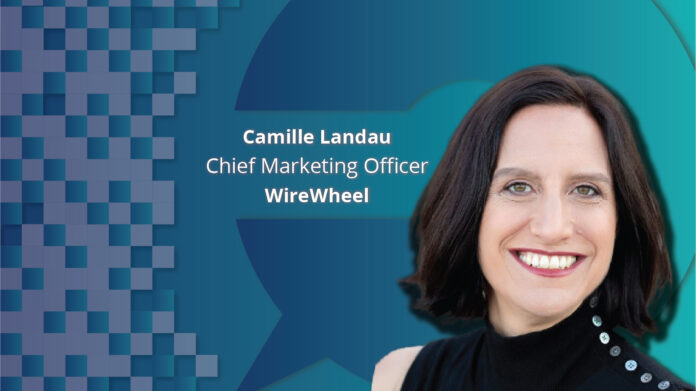“The end of third-party cookies gives an opportunity to the entire advertising industry to rethink how user privacy can coexist with current and emerging advertising models,” says Camille Landau, Chief Marketing Officer at WireWheel, in an exclusive interview with TalkCMO.
TCMO Bureau: How will the death of third-party cookies impact digital advertising? What comes next for digital advertisers?
Camille Landau: The death of third-party cookies will probably have heterogeneous impacts on the industry. Smaller brands and advertisers may have difficulty competing in the event there is no accepted global standard when the third-party cookies disappear from Chrome.
On one side, advertisers with large traffic who have invested in first-party data may see the little-to-no impact. On the other side, smaller websites relying on third-party cookies for data enrichment and increased reach may see their campaign performance and return on advertising spend drop. Brands, publishers, and agencies will need to collaborate to define a viable long-term standard with interoperability and privacy as key components.
Also Read: Does Google Care for User Privacy?
TCMO Bureau: How can contextual marketing help brands with the demise of third-party cookies?
Camille Landau: Contextual marketing could be an interesting privacy-friendly alternative. First, contextual marketing aims at leveraging first-party data, making it a less intrusive approach than behavioral targeting (tracking user’s behavior on site, links clicked, pages visited, etc.). Second, it gives marketers the ability to draft more granular segments and push personalization further, resulting in a better customer experience. Finally, contextual marketing does not require a vast amount of data and could offer smaller brands in niche markets the ability to compete efficiently.
TCMO Bureau: In what ways does the end of third-party cookies impact user privacy?
Camille Landau: While third-party cookies are being sunsetted, in part, to improve consumer privacy, it’s likely that workarounds will subject consumers to similar risks. Ideally, the change will deepen brands’ thinking about how they can effectively solicit zero- and first-party data in a way that improves the customer experience while concurrently meeting revenue and CLV goals.
The end of third-party cookies gives an opportunity to the entire advertising industry to rethink how user privacy can coexist with current and emerging advertising models. This is a positive development for user privacy in general and, in addition to marketers’ incentive to better understand their customers (so as to provide them with greater value), many ad tech players are working on digital identity initiatives to better embed privacy in the advertising chain. However, the lack of a globally accepted standard may deliver different levels of privacy-friendly experiences.
TCMO Bureau: What impact will there be for programmatic advertising in a world without third-party cookies?
Camille Landau: Third-party cookies are the foundation of the existing programmatic advertising structure. They power identity matching, retargeting, audience activation, capping, and attribution. Without an accepted alternative, interoperability issues and limitations at various stages of the advertising value chain are expected. Although programmatic advertising has been tested over the past few years with new privacy regulations, and while Safari and Firefox have already ended their support of third-party cookies, the real test for the industry is coming with Chrome. Marketers will need to have a response that ensures not only relevant advertising but also efficient processes throughout the chain.
Also Read: 2021 Forecast: Marketing Strategy in a Post-Cookie World
TCMO Bureau: How will the lack of third-party cookies affect websites? How can websites prepare for the post-cookie world?
Camille Landau: Businesses should prepare their websites for the post-cookie world by making it simple for customers to express their communication and data use preferences, and by endeavoring to use customer data in a way that provides value for customers.
First-party data will be a focus for websites in the post-cookie world. But in order to leverage first-party data, websites will first need to collect it and this will require preparation and thinking. Improved website experience, faster onsite value delivery, and greater transparency will all be important aspects in building a successful first-party data approach.
TCMO Bureau: What alternatives are out there for brands and marketers in place for third-party cookies? What is the next step for brands that haven’t given enough importance to their own first-party data?
Camille Landau: Tech companies are taking a swing at this. Google’s Privacy Sandbox is an example. Among other things it’s testing to replace third-party cookies is an API called Federated Learning of Cohorts (FLoC). FLoC creates cohort group identities instead of individual identities for targeting advertising.
Beyond the big tech companies’ individual agendas and approaches, there are many industry groups focused on coming up with cookie alternatives with privacy controls at the center. The W3C has established the Privacy Community Working Group. The Partnership for Responsible Addressable Media (PRAM), a joint-industry initiative, is working on safeguarding privacy and consumer experiences, the IAB Tech Lab is addressing this through Project Rearc. The TradeDesk has introduced Unified ID 2.0.
These, however, are longer-term solutions. For now, and going forward, I would recommend focusing on the ability to collect, segment, and derive value (for the consumer, which will translate to value for the company), from first-party data. Present a viable value proposition for users to feel comfortable sharing their information; share how it will be used to benefit them, and demonstrate the value of the data you receive in improved customer insights, product, offers, pricing, and customer support. Update and improve your consent mechanisms and privacy policies.
Think about what data is necessary and relevant before you collect it, and follow best practices around deleting it. Leverage the data for purposes that benefit the customer, and results will include higher customer loyalty and ultimately growing CLV.
Camille Landau is the CMO of WireWheel, which provides privacy management software, solutions and advising to global companies and startups. Prior to WireWheel, she led, OminSparx, offering a privacy-focused marketing platform to crypto/blockchain communities.







